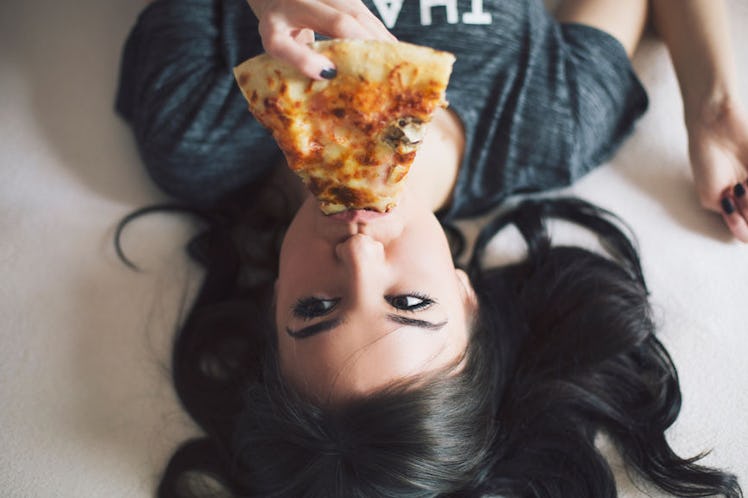
Here's The Best Way To Approach Your Meals If You're Absolutely Sick Of Dieting
Is it just me, or has eating has become much more complicated than it has to be? Normally I’d tell you to think about how many different styles of eating exist in the world, but a quick scroll through Twitter or Instagram will do the grunt work for you. Granted, some people really do need diet plans to sustain their health, but if fad diets and trendy food programs your favorite celebs swear by aren’t making you feel like the best version of yourself, you might want to consider intuitive eating. What is intuitive eating, you ask? It sounds pretty new-agey, right? Well, prepare to have your mind blown because, chances are, you probably followed this way of eating up until the exact moment you started dabbling in diets. Cue the face palm, because you're about to wonder why you ever stopped intuitively eating in the first place.
Food is a sensitive topic for me. As someone who’s struggled with body dysmorphia and eating disorders from a young age, it took a long time for me to patch up my once-healthy relationship with the things I’d feed my body with, but there was a time before my ED — and before my body dysmorphia — that I had a very healthy relationship with food and personally, I believe this is because growing up, I didn’t think about it.
Food is fuel, and food is pleasure; it is meant to be enjoyed and used as a tool to take care of our bodies. To eat intuitively is to understand that, and make decisions about food based on what your body needs, and, sometimes, what it wants.
Intuitive eating is not a diet or quick fix, but, rather, a lifestyle that focuses on listening to your body and responding accordingly.
If this is your first time hearing about intuitive eating, it’s worth noting that this seemingly "newfound" way of approaching food has been around for awhile. The actual term, Hello Giggles reports, was coined in the 1990s by the self-proclaimed intuitive eating pros Evelyn Tribole, RD, and Elyse Resch, RDN. Off the bat, the concept behind intuitive eating might be difficult to grasp, seeing as there’s no set guidelines to follow, no eliminations, or restrictions to adhere to. In other words, all the ways you can fail at dieting, don't exist in intuitive eating.
According to Lisa Samuels, RD, founder of The Happie House, intuitive eating can be summed up as, basically, the anti-diet, because it really only requires you to do two things: listen to your body (aka your intuition), and give it what it needs. Makes sense, right?
“In dieting, you are usually set to a certain plan or number of calories no matter what,” Samuels tells Elite Daily. “Even if you desire more, you are committed to staying within those limits." Intuitive eating, she explains, is the opposite of the diet mentality because "you are eating without feeling guilt or shame. You are listening to your body’s cues, eating when you are hungry and stopping when you are satisfied."
So how do you make the switch from following a strict diet plan, to eating 100 percent intuitively?
Trust me, I know how difficult it can be to let go of the kinds of restrictions diets drill into your brain, like, say, counting calories or watching your fat intake. Especially if you’ve been experimenting with different plans for awhile, eating according to when and how a pre-made plan instructs you to, you might not be able to properly gage when you’re actually hungry, or just craving food because you’re bored, stressed, or have been deprived of something for so long. Practicing intuitive eating can fix that by helping you hone these important skills.
In an interview with Elite Daily, Grace Derocha, registered dietitian, certified diabetes educator and certified health coach at Blue Cross Blue Shield of Michigan, explains that a good way to go about intuitive eating when you're just getting started, is to rate your hunger on a scale of one to 10. A one means you're not hungry at all, and 10 basically means you'd eat anything anyone puts in front of you.
"Being aware of hunger cues throughout the day helps us maintain a regular flow of food, so we’re likely to make better choices, rather than the closest, potentially unhealthy food options," she says, adding that, initially, successfully switching to intuitive eating is going to take baby steps, and it's OK to misjudge your cravings. "Don’t beat yourself up if you slip and have a dessert or chips, just make healthier choices for the next meal or snack, and be mindful of how many unhealthy options you are consuming on a regular basis."
Understanding your body is a learning process, and understanding how to eat, what to eat, and when, can be just as much of a project after you've been following diets for so long. The easiest way I can put it is this: You know the difference between healthy foods and indulgent foods. The key to intuitive eating is to trust your body, pay attention to the foods you eat, and really listen to what your body is telling you. Listen to your gut, and it won't steer you wrong. You might get your signals crossed, but that's OK. Listen to your body, and try again tomorrow.